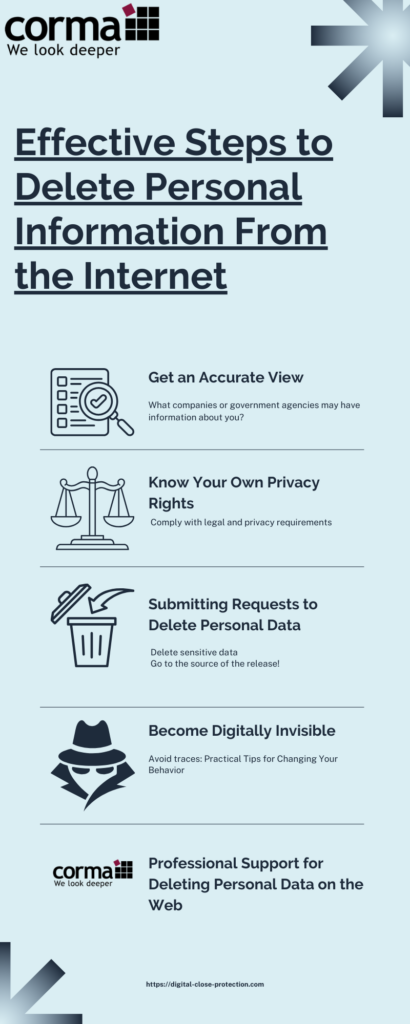In an increasingly digital world, effective management of personal information is a key challenge. For executives, VIPs, and other high-profile individuals, protecting their data online is not only a matter of privacy, but also of personal security. Personal information published online-whether through social media, corporate registries, or accidental data leaks-can pose a wide range of risks. From identity theft and reputational damage to targeted attacks, the dangers that can result from the uncontrolled distribution of personal information are many.
In this blog post, we look at the important task of eliminating digital traces and removing personal information from the Internet. We look at why it is critical to maintain control of your data and how to take effective action against unwanted exposure. Whether it’s deleting old business information, adjusting privacy settings on social networks, or taking legal action, we offer practical solutions and expert advice to protect your digital identity. Our goal is to provide you with the knowledge and tools you need to securely manage your personal information and proactively protect your digital presence. Rely on corma’s expertise to ensure your digital safety in a world where information is just a click away.
Summary: “Digital Traces: The Challenge of Public Personal Data”
In a world where our digital presence continues to grow, protecting personal information online is critical. This blog post is aimed at executives, VIPs, and other high-profile individuals who face the risks of unchecked dissemination of personal information, such as identity theft, reputational damage, and targeted attacks. We look at how to take effective action against unwanted exposure, from deleting old business information to adjusting privacy settings on social networking sites. The article offers practical solutions and expert advice on how to protect your digital identity and manage your personal information securely. With the help of professional services like corma GmbH, you can ensure your digital security in a world where information is just a click away.

Effective Steps to Delete Personal Information From the Internet
The first step is to get an accurate picture of what companies or government agencies may have information about you. This includes:
- Contact and account information from online retailers
- Searched products, locations, contacts from applications
- Government address databases
- Press articles from online newspapers
In most cases, you can find many relevant places just by doing your own research. It is even easier with credit reporting agencies such as datarequest.
Know Your Legal Rights
It is also important to be aware of our data protection rights: every EU citizen has the right to know what personal data a company has stored about them and can request that it be deleted.
In the case of clearly incorrect data or data that has been collected unlawfully, there is a right to rectification or erasure. Outdated data that has fulfilled its original purpose also has to be deleted.
Submitting Deletion Requests – Deleting Sensitive Data
Once you have identified all relevant data holders, you need to take action. Online retailers often provide options for correcting or deleting data such as address book entries and account information under “My Account” or in the help section.
For government agencies and businesses without an online form, you can request the deletion of personal information by email, through contact forms, or through forms provided by consumer protection agencies.

Going to the Source of Publication – Right of Erasure
Deleting unwanted data from the Internet can be a challenge, especially when it comes to hard-to-delete content such as press articles. The key is to go directly to the source. Instead of focusing on search engines like Google, you should contact the operator of the website where the data is published. For example, this could be the commercial register for business information or the website operator for personal content.
Particularly Persistent Data Traces Despite the Right to Be Forgotten
However, press articles, Internet publications, and some credit reports can only be deleted with great difficulty. Although in principle there is a “right to be forgotten”, in practice publishers often invoke freedom of information and freedom of the press.
Without legal action, the only options are regular contact with the responsible parties or technical solutions. For example, you could monitor your own name with an online reputation protection service and use SEO to ensure that more positive search results appear higher in the event of critical press mentions.
As you can see, permanently deleting unwanted data can be tedious. But it’s worth it: the less superfluous information companies store and trade about us, the better it is for our privacy.
Another effective strategy is behavioral change and privacy education to become more digitally invisible. This includes rethinking the information we share and adjusting our privacy settings on social networks. It is important to understand that even small fragments of information can be pieced together into a complete picture in the hands of experts. Therefore, it is critical to be proactive and take control of your online presence. For more complex cases, the support of professional data protection services such as corma GmbH may be essential to ensure comprehensive protection of your digital identity.
Comply With Legal and Privacy Requirements
When deleting digital traces, it’s important to understand the legal framework and data protection laws. The GDPR applies in the EU and gives data subjects extensive rights.
According to Article 17 of the GDPR, every citizen has the right to request the deletion of their personal data. In many cases, data processors are required to delete data immediately. This applies, for example, to information that is no longer needed for its original purpose or if its storage was unlawful.
For example, if you want to delete Google listings, outdated address information from online stores, or other unwanted data on the Internet, you can contact the data controller directly. In many cases, a simple request via a contact form or email with a reference to the GDPR will be enough to force the deletion of personal data.
However, if the data controller refuses to delete or restrict the processing, it is worth consulting a lawyer. You can enforce the “right to be forgotten” under the GDPR, and take legal action against any further storage or disclosure of sensitive data.
You should also check whether published data, such as press articles, are true. Under the GDPR, data subjects also have the right to have inaccurate data corrected.
Many Internet users are often unaware of the dangers posed by the widespread dissemination of personal data. Whether through social media activities, online purchases, or website registrations, you leave traces everywhere that are difficult to erase. It gets especially tricky when outdated data, false information, or past indiscretions show up in search engines and damage your reputation.
Fortunately, the GDPR gives data subjects broad rights to take action against the spread of unwanted data. For example, Internet users can ask companies like Google to delete search results or other online content. Targeted requests based on Article 17 of the GDPR on the “right to be forgotten” can often remove unwanted Google listings within a few weeks.
You should also be aware of your rights with online retailers, social networks and other platforms, and be consistent in demanding them. Deleting personal information can prevent reputational damage and protect your own online reputation. However, being careful with sensitive information is the best way to protect yourself from unwanted publicity.
The Right to the Erasure of Personal Data in the Digital Space
In response to extensive digital interconnectivity, the right to erasure of personal data is increasingly coming into focus. According to Article 17 of the GDPR, individuals have the right to request the erasure of their personal data. This includes data published on the Internet, whether in search engine results such as Google or Yahoo, or on the websites of data brokers. The deletion of such data, often referred to as the “right to be forgotten,” allows individuals to regain control of their online presence and protect their privacy.
The challenge is that deleting this data is not always easy. In some cases, such as when Google’s records are outdated or data is processed pursuant to a legal obligation or for the exercise or defense of legal claims, there may be exceptions to the deletion requirement. Individuals who wish to have their information removed from the Internet often need to take certain steps to have their information removed. This includes submitting a request for deletion and navigating the often complex deletion process.
It is important to note that the removal of personal information includes not only the removal of content from search engines, but also the removal of all links to that information, as well as the removal of the information from the databases of data brokers. This process can take time, and often requires the assistance of professionals familiar with the specific requirements of the GDPR and other data protection laws. Ultimately, the right to erasure aims to ensure that personal data is only processed for as long as necessary and with the consent of the data subject.
Comprehensive Strategies for the Deletion of Personally Identifiable Information From the Internet
The deletion of personal data from the Internet, a key issue in the context of data protection, is governed by Article 17 of the GDPR and the right to be forgotten. This right allows individuals to request the deletion of their personal data, in particular when that data is no longer needed or when the data subject withdraws their consent to data processing. The challenge is that deleting this data from the Internet, including search engine results such as Google, is not always straightforward. Often, specific steps must be taken to achieve deletion, such as submitting a request for deletion or navigating the complex data deletion processes.

Deletion of personal information involves not only removing the content from search engines, but also removing all links to the information and removing the information from data brokers’ databases. This process can take time, and often requires the assistance of professionals familiar with the specific requirements of GDPR and other data protection laws. It is important to note that deleting personal data includes not only removing the content from search engines, but also removing all links to that data and deleting the data from data brokers’ databases. This process can take time, and often requires the assistance of professionals familiar with the specific requirements of the GDPR and other data protection laws. Ultimately, the right to erasure aims to ensure that personal data is only processed for as long as necessary and with the consent of the data subject.
Practical Tips to Change Your Behavior
In addition to legally enforcing the right to erasure, you should also think about your own online behavior. After all, many people leave a trail of data on Google, social media, or when shopping online.
A fundamental change in attitudes is essential to prevent future problems when it comes to erasing digital traces. People should be sensitive about sharing personal information and only share what is absolutely necessary.
For example, you don’t need to use your real name for many online purchases or registrations. Similarly, when using social media, think carefully about what information is really needed.
In general, restraint is advised: everything you share online is difficult to get back. With a regular “digital spring cleaning”, existing data repositories such as Facebook history or Google account data can at least be combed through and cleaned up. It also makes sense to delete accounts that are no longer needed.
Conscious online behavior is the best protection against unwanted digital traces. Coupled with an understanding of the legal options for deleting sensitive data, this means more control over your own online reputation.
Professional Assistance in Deleting Personal Data: The Path to Better Privacy
Removing personal data from the Internet is a complex challenge. This is where professional data protection services such as corma GmbH come in. corma offers customized support based on a thorough analysis of your digital footprint. This first step is crucial in order to develop an effective erasure concept that is specifically tailored to your needs.
The experts at corma understand the complexities of the various platforms and search engines, such as Google, and know how to effectively delete or remove data. They navigate the legal aspects of the “right to be forgotten” under GDPR and other data protection laws to ensure that your personal data is removed not only from search results, but also from the sources themselves. This process includes identifying the data that needs to be removed, and working with platforms and search engines to achieve removal.
Corma’s services go beyond the simple removal of Google listings. They provide comprehensive advice and support to ensure that your data is not only removed from the web, but also protected in the future. This includes advice on restricting the processing and dissemination of your data and assistance in implementing privacy policies. With corma on your side, you can rest assured that your personal information is being managed professionally and effectively to ensure your digital privacy and security.
Proactive Handling of Personal Information
As our digital presence continues to grow, it is important to take a proactive approach to personal information. Removing digital traces is more than just a response to privacy concerns; it’s an essential step in maintaining your privacy and security. Deleting data from Google search results or removing personal information from the web are important steps in maintaining control over your online identity.
The right to be forgotten, as strengthened by the GDPR and ECJ rulings, allows you to request the removal of your data. This includes the removal of data from Google’s records and the deletion of data that is no longer needed for its original purpose or may not be processed under any other legal basis. It is important to be aware of these rights and to actively exercise them.
Remember that managing your digital footprint is an ongoing task. Review your online presence regularly, update your privacy settings, and be careful about the information you share. If your data is processed without your consent, you have the right to request its deletion within one month.
Finally, it is advisable to seek professional assistance to ensure comprehensive protection of your digital identity. Experts like those at corma GmbH can help you manage your data effectively and protect your privacy in the digital world. By actively managing your digital presence, you can better protect yourself from identity theft and other online threats.
Summary and Key Findings
Digital empowerment: A guide to protecting your privacy online
In a world where digital traces have a profound impact on our privacy and security, awareness and control over the dissemination of personal information is critical. This blog post highlights the importance of protecting personal information online and provides practical steps for deleting unwanted information.
Key points of the article:
- Get an overview: Identify what information is available about you on the Internet.
- Know your rights: Take advantage of your data protection rights, especially the right to erasure under the GDPR.
- Take action: Submit erasure requests to online retailers, government agencies, and other data holders.
- Go directly to the source: Contact website operators to have unwanted content removed.
- Right to be forgotten: Despite the challenges, it is possible to remove persistent traces of data.
- Change your behavior: Be careful about the information you share online.
- Get professional help: Consult experts like corma GmbH to protect your digital identity.
Call to Action: This article is intended to motivate you to be more aware of your personal information. Review your online presence regularly, update your privacy settings, and be careful with the information you share. If your information is processed without your consent, you have the right to request deletion within one month. Use available resources and professional assistance to strengthen your digital security. Take control of your digital security – it’s your right and your responsibility.

Take control of your digital security – Contact corma
Your digital presence and security are too important to leave to chance. If you are unsure about how to manage your online identity and protect your personal information, we are here to help. The experts at corma GmbH offer personalized advice and customized solutions to strengthen your digital security.
Please do not hesitate to contact us. Whether by email, phone or online meeting, we are here to answer your questions and work with you to develop the best strategies for your digital protection. Simply schedule a meeting at corma.de/meeting and take control of your digital security. We look forward to helping you!
FAQ – Frequently asked questions on the topic:
Deleting personal data on the Internet
What is the right to request deletion of data?
The right to erasure, also known as the “right to be forgotten,” is an essential part of data protection, especially in the context of the European General Data Protection Regulation (GDPR). It allows individuals to request the deletion of their personal data, provided that certain conditions are met. These include situations where the data is no longer needed for the original purpose for which it was collected, or where the data subject withdraws their consent to data processing.4
The right to erasure applies not only to the removal of data from search engines such as Google, but also to websites, databases and archives. It includes the deletion of outdated, misleading, incomplete or unlawfully processed data. This right is particularly relevant to online privacy, as it allows individuals to control their online presence and the dissemination of their personal information.
However, it is important to note that the right to erasure is not absolute. It must be balanced against the public interest and the rights of others, such as freedom of expression. In certain cases, for example, where data processing is necessary for the exercise of the right to freedom of expression and information, or for reasons of public interest in the area of public health, the right to erasure may be limited.
In summary, the right to erasure enables individuals to regain control over their personal data in the digital space and helps to protect their privacy and digital identity.
When can you exercise your right of deletion?
The right to erasure, also known as the “right to be forgotten,” can be exercised in a variety of situations.
Here are some of the most common:
No longer necessary: If personal information is no longer necessary for the purposes for which it was originally collected or processed, erasure may be requested.
Withdrawal of consent: If the processing of the data is based on the consent of the data subject and the data subject withdraws his or her consent without any other legal basis for the processing.
Unlawful processing: When the data is processed unlawfully, for example, without complying with data protection regulations.
Objection to processing: When the data subject objects to the processing of his or her data and there are no overriding legitimate grounds for the processing.
Legal requirements: Where erasure is necessary to comply with a legal obligation to which the controller is subject.
Children’s data: In particular, when collecting data from children in connection with the use of Internet services.
It is important to note that the right to erasure is not absolute and may be subject to restrictions in certain cases, such as where processing is necessary for the exercise of the right of expression and information, for compliance with a legal obligation, or for reasons of public interest in the area of public health.
What steps are required to request data deletion?
Deleting data, especially online, can be a complex process depending on the type of data and platform. Here are the basic steps to follow:
Identify the data: First, you need to determine exactly what data you want to delete. This could be personal information on a social media platform, in an online forum, or in the search results of a search engine.
Contact the data controller: Contact the website, service, or platform where your information is stored. Many companies have dedicated privacy officers or contact forms for such requests.
Formal request: Submit a formal request for data deletion. This request should clearly and precisely state what data should be deleted and why. It is helpful to refer to the specific data protection laws or guidelines that apply in your country or region, such as the GDPR in the European Union.
Proof of lawfulness: You may need to prove that the data was collected unlawfully, is no longer relevant, or violates your rights. In some cases, it may be necessary to confirm your identity to prevent misuse.
Waiting for a response: After submitting your request, you will need to wait for a response. Processing time may vary depending on the company and its policies.
Follow-up requests: If your request is denied or there is no response, you can make a follow-up request or contact a supervisory authority. In some countries, there are special data protection authorities that can help in such cases.
Review: After the data has been deleted, it is a good idea to review it. In some cases, it may take some time for the data to be completely removed from all systems.
It is important to note that not all data removal requests are approved. In some cases, companies or platforms may have legitimate reasons to retain certain data, such as for legal or security reasons.
How do I remove outdated information from search engines?
There are several steps you can take to get outdated information removed from search engines like Google. First, you should try to contact the owner of the website where the outdated information is posted and ask them to remove the content.
If the content has been removed from the site, you can use Google’s “Update outdated content” tool to request that search results be updated.
If the content violates Google policies or contains personal information, you can submit a removal request. Google provides different forms for different types of requests, such as removing offensive or intimate personal images, unauthorized pornography, or personal information.
You can find these forms on the “Removing information from Google” help page.
What is the legal basis for the right of erasure?
The right to erasure, also known as the “right to be forgotten,” is enshrined in the European Union’s General Data Protection Regulation (GDPR). This right allows individuals to request the erasure of their personal data, provided that certain conditions are met. The legal grounds for the right to erasure include:
Compliance with a legal obligation: under Article 17 of the GDPR, individuals have the right to request the erasure of their data if the processing is no longer lawful, for example, if the data processing is in breach of the GDPR.
Data that is no longer needed: If personal data is no longer necessary for the purposes for which it was originally collected or processed, erasure can be requested.
Withdrawal of consent: If the processing of the data is based on the consent of the data subject, and the data subject withdraws his or her consent without any other legal basis for the processing.
Objection to Processing: Individuals have the right to object at any time to the processing of their personal data on grounds relating to their particular situation.
Unlawful processing: Where the processing of personal data has been carried out unlawfully, for example, without the necessary consent or in breach of the GDPR.
Legal requirements: Erasure may be necessary to comply with a legal obligation imposed on the data controller under European Union or Member State law.
However, the right to erasure is not absolute and may be subject to restrictions, for example where the processing is necessary for the exercise of the right of freedom of expression and information, for compliance with a legal obligation, for reasons of public interest, or for the establishment, exercise, or defense of legal claims.
What types of personal information can be deleted?
You can have several types of personal information on the Internet deleted, especially if it is outdated, misleading, or has been processed unlawfully.
This includes:
First and last name: If your full name appears online in a way that compromises your privacy or security, you can request that it be removed.
Addresses: Home and business addresses can be removed from online directories or other websites, especially if they present a security risk.
Contact Information: This includes phone numbers and email addresses that have been published without your consent.
Pictures and videos: Photos or videos that show you in person and have been posted online without your consent can be requested for removal.
Professional information: Information about your work history that is outdated or incorrect can also be removed.
Social media content: Posts or comments on social networking sites that could damage your reputation can also be deleted.
Personal information in databases: Entries in online databases or search engines that contain personal information may be deleted.
It is important to note that the right to erasure of personal data is strengthened by the General Data Protection Regulation (GDPR) in the EU and similar laws in other countries. However, the data erasure process may vary depending on the platform and the type of data.

